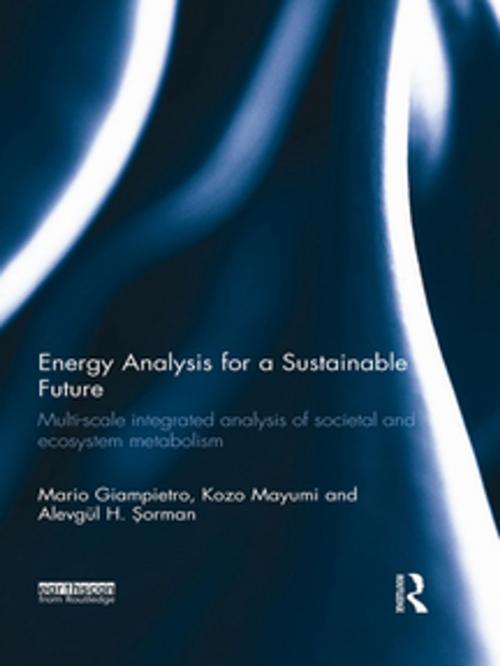Energy Analysis for a Sustainable Future
Multi-Scale Integrated Analysis of Societal and Ecosystem Metabolism
Business & Finance, Economics, Sustainable Development, Economic Development| Author: | Mario Giampietro, Kozo Mayumi, Alevgül H. Şorman | ISBN: | 9781136264009 |
| Publisher: | Taylor and Francis | Publication: | March 5, 2013 |
| Imprint: | Routledge | Language: | English |
| Author: | Mario Giampietro, Kozo Mayumi, Alevgül H. Şorman |
| ISBN: | 9781136264009 |
| Publisher: | Taylor and Francis |
| Publication: | March 5, 2013 |
| Imprint: | Routledge |
| Language: | English |
The vast majority of the countries of the world are now facing an imminent energy crisis, particularly the USA, China, India, Japan and EU countries, but also developing countries having to boost their economic growth precisely when more powerful economies will prevent them from using the limited supply of fossil energy.
Despite this crisis, current protocols of energy accounting have been developed for dealing with fossil energy exclusively and are therefore not useful for the analysis of alternative energy sources. The first part of the book illustrates the weakness of existing analyses of energy problems: the science of energy was born and developed neglecting the issue of scale. The authors argue that it is necessary to adopt more complex protocols of accounting and analysis in order to generate robust energy scenarios and effective assessments of the quality of alternative energy sources.
The second part of the book introduces the concept of energetic metabolism of modern societies and uses empirical results. The authors present an innovative approach – Multi-Scale Integrated Analysis of Societal and Ecosystem Metabolism (MuSIASEM) – capable of characterizing the quality of alternative energy sources in relation to both environmental constraints and socio-economic requirements. This method allows the metabolic pattern of a society to be described in relation to its feasibility, when looking at biophysical factors, and desirability, when looking at socio-economic factors.
Addressing the issue of scale in energy analysis by cutting through the confusion found in current applications of energy analysis, this book should be of interest to researchers, students and policy makers in energy within a variety of disciplines.
The vast majority of the countries of the world are now facing an imminent energy crisis, particularly the USA, China, India, Japan and EU countries, but also developing countries having to boost their economic growth precisely when more powerful economies will prevent them from using the limited supply of fossil energy.
Despite this crisis, current protocols of energy accounting have been developed for dealing with fossil energy exclusively and are therefore not useful for the analysis of alternative energy sources. The first part of the book illustrates the weakness of existing analyses of energy problems: the science of energy was born and developed neglecting the issue of scale. The authors argue that it is necessary to adopt more complex protocols of accounting and analysis in order to generate robust energy scenarios and effective assessments of the quality of alternative energy sources.
The second part of the book introduces the concept of energetic metabolism of modern societies and uses empirical results. The authors present an innovative approach – Multi-Scale Integrated Analysis of Societal and Ecosystem Metabolism (MuSIASEM) – capable of characterizing the quality of alternative energy sources in relation to both environmental constraints and socio-economic requirements. This method allows the metabolic pattern of a society to be described in relation to its feasibility, when looking at biophysical factors, and desirability, when looking at socio-economic factors.
Addressing the issue of scale in energy analysis by cutting through the confusion found in current applications of energy analysis, this book should be of interest to researchers, students and policy makers in energy within a variety of disciplines.















